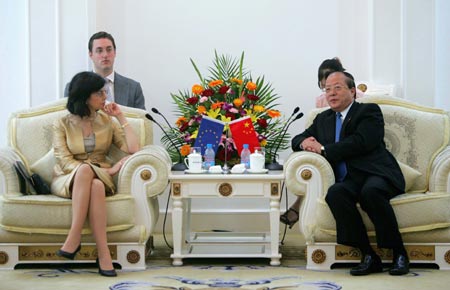More food safety info to be shared
By Zhu Zhe (China Daily)Updated: 2007-07-24 06:50
 European Union (EU) Consumer Protection Commissioner Meglena Kuneva (L) listens to Minister of China's General Administration of Quality Supervision, Inspection and Quarantine Li Changjiang (R) in Beijing July 23, 2007. [Reuters] |
Chinese and European Union (EU) quality control officials yesterday agreed to share more information on seizures of substandard consumer products and strengthen law enforcement to better combat unsafe goods.
The two sides will have to thrash out the details of the action plan.
For now, safety watchdogs from the two sides will exchange more information on unsafe products in the EU rapid alert system for non-food products, known as RAPEX, to help them better select targets for enforcement.
The agreement is the latest between China and the EU, AQSIQ Minister Li Changjiang said after he met with the visiting EU Consumer Protection Commissioner Meglena Kuneva in Beijing yesterday. But officials gave no further details.
The two sides signed a cooperation agreement in January giving China access to RAPEX. The Chinese side agreed to help track down the Chinese culprits who supplied substandard products to the EU.
China has also vowed to crack down on substandard product makers in general.
Under RAPEX, about 48 percent of the 924 products identified as unsafe for the EU market last year were from China, down 2 percentage points than the previous year.
Commissioner Kuneva said she had seen China improve its handling of products, but the EU wanted Beijing to help avoid consumer safety firestorms by tracing more complaints down the trade chain to the factory floor.
"Yes, there is an improvement but also it's equally valid that there is need of the reforms to be stepped up on the market and on market surveillance," she said.
Minister Li acknowledged that the safety of Chinese products had been in the global spotlight recently. But he said product safety was not only China's concern, but also the common responsibility of all countries.
AQSIQ figures show that in the first half of this year, 98.8 percent of the food products from the EU were up to standard, 1 percentage point less than the equivalent figure for Chinese food exports to the EU.
Also, about 1.1 percent of the food products from Japan to China in the first six months were not up to standard.
Last week, the AQSIQ issued a warning and asked for tighter control over aquatic products from Japan after infective anisakis worms, a genus of parasitic nematodes, was found in two types of fish from the country. The worms can cause violent abdominal pain, nausea and vomiting within hours after ingestion.
Today, Kuneva will meet with senior officials of the State Administration of Industry and Commerce, and head for East China's Jiangsu Province to visit toy factories and test centers to see how Chinese surveillance works.
(China Daily 07/24/2007 page2)
|
||
|
||
|
|
